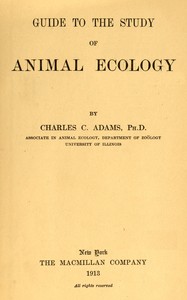Guide to the study of animal ecology by Charles C. Adams
"Guide to the Study of Animal Ecology" by Charles C. Adams is a scientific publication written in the early 20th century. The book serves as a practical guide designed to aid beginners in the study of ecology, specifically animal ecology, by outlining methods of approach and discussing various ecological relationships. It emphasizes the importance of understanding how animals interact with their environments and each other. The opening of the book features a
preface that outlines the author's intent and the structure of the text. Adams conveys his efforts over ten years to organize the significant facts related to ecology and suggests that the work is not an exhaustive treatise but rather a tool to help students grasp the fundamental concepts and methodologies related to ecological studies. He discusses the various components of ecology, including individual, aggregate, and associational ecology, and emphasizes the need for independent thinking and scientific methods when conducting ecological investigations. Additionally, he acknowledges the collaborative nature of ecological research and the critical importance of proper ecological surveys in understanding animal communities and their environments. (This is an automatically generated summary.)
Read now or download (free!)
| Choose how to read this book | Url | Size | ||||
|---|---|---|---|---|---|---|
| Read online (web) | https://www.gutenberg.org/ebooks/71454.html.images | 574 kB | ||||
| EPUB3 (E-readers incl. Send-to-Kindle) | https://www.gutenberg.org/ebooks/71454.epub3.images | 1.7 MB | ||||
| EPUB (older E-readers) | https://www.gutenberg.org/ebooks/71454.epub.images | 1.7 MB | ||||
| EPUB (no images, older E-readers) | https://www.gutenberg.org/ebooks/71454.epub.noimages | 262 kB | ||||
| Kindle | https://www.gutenberg.org/ebooks/71454.kf8.images | 2.1 MB | ||||
| older Kindles | https://www.gutenberg.org/ebooks/71454.kindle.images | 2.0 MB | ||||
| Plain Text UTF-8 | https://www.gutenberg.org/ebooks/71454.txt.utf-8 | 332 kB | ||||
| Download HTML (zip) | https://www.gutenberg.org/cache/epub/71454/pg71454-h.zip | 1.8 MB | ||||
| There may be more files related to this item. | ||||||
About this eBook
| Author | Adams, Charles C. (Charles Christopher), 1873-1955 |
|---|---|
| LoC No. | 13017678 |
| Title | Guide to the study of animal ecology |
| Original Publication | New York: The Macmillan Company, 1913. |
| Note | Reading ease score: 52.9 (10th to 12th grade). Somewhat difficult to read. |
| Credits | The Online Distributed Proofreading Team at https://www.pgdp.net (This file was produced from images generously made available by The Internet Archive) |
| Language | English |
| LoC Class | QH: Science: Natural history |
| LoC Class | QL: Science: Zoology |
| Subject | Animal ecology |
| Category | Text |
| EBook-No. | 71454 |
| Release Date | Aug 20, 2023 |
| Copyright Status | Public domain in the USA. |
| Downloads | 170 downloads in the last 30 days. |
| Project Gutenberg eBooks are always free! | |

